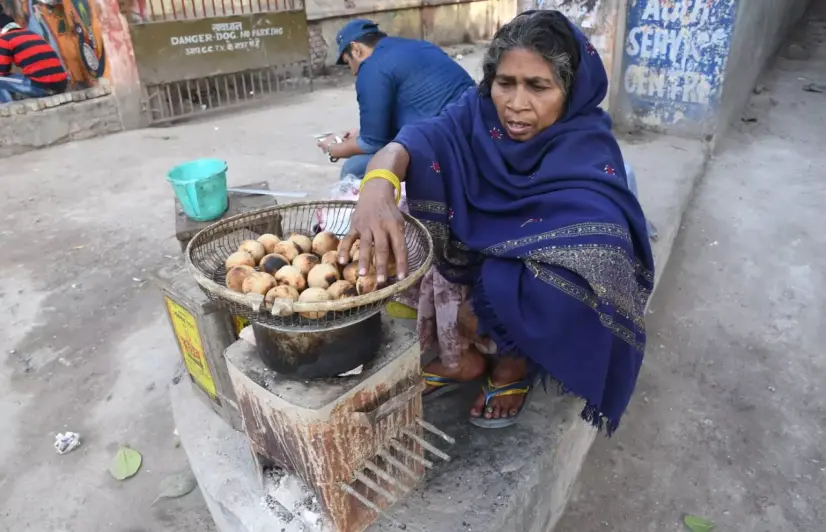Bihar women missing from workforce, finds survey

Bihar women missing from workforce, finds survey
Patna, Bihar: Bihar has the lowest rate of women working in the country, surveys show. Experts say that the disproportionate contribution to unpaid labour by women, the lack of policies and employment opportunities and predated gender roles are the reasons behind this phenomenon.
According to the Times Use Survey (TUS) by the National Statistical Office (NSO), 96% of women in Bihar are involved in unpaid caregiving and domestic activities, while it also records the lowest women workforce participation rate (WPR) in the country at 2.7%. While Bihar followed the national trend, which showed a loss of employment opportunities for women, the state had a lower WPR for women when compared with the national average, according to the Periodic Labour Force Survey (PLFS) by the NSO.

Speaking to 101Reporters, Nisha Jha, who recently retired from her post as an adviser to the Ministry of Women and Child Development (WCD), stated the orthodox mindset in Bihar prevents women from entering the workforce. Even if a woman has a full-time job, she is also expected to fulfil her responsibility as a housewife, she added.
Jha suggested that the government should prepare a database for literate and illiterate women in the state to find out the number of employable women and allocate resources accordingly. She added that even illiterate women shouldn’t be left out and be employed in whatever field they can contribute.
High contribution to unpaid labour
According to PLFS, while 81% of women in rural areas and 70% of women in urban areas are involved in unpaid domestic activities, only 1% of men contribute to domestic chores.
Gunjan Bihari, Senior Program Officer, Centre for Catalyzing Change (C3), a non-governmental organisation (NGO) working towards women empowerment, highlighted that women in Bihar spend more than eight hours on unpaid labour each day. She lamented the time women have to spend in such activities, which prevents them from seeking employment.
“It is imperative to revisit the definition of ‘economic activities’ and create scope for the systemic and socio-cultural recognition of women’s unpaid contribution to the economy,” she mentioned.
Experts say that when there are no young children at home, then the labour force participation rate of women is higher. Experts also note that having elderly members in the household increases a woman’s chance to join the workforce, reflecting how childcare and other domestic responsibilities are delegated between household members, thus freeing up a woman’s time for paid work. In situations where childcare and domestic support isn’t available, women continue to be outside the workforce.
Sahina Parween, a social activist, stated that there are many social issues holding women back from entering the workforce.
She pointed out how only women contribute to household chores and claimed that it’s because of the patriarchal society. Men are prepared to earn money, and behind these gender-based roles, the established patriarchy prevents the woman from going out, she commented.
Harjot Kaur Bamhrah, Managing Director, Women Development Corporation, Government of Bihar, told 101Reporters that despite high growth rates and the highest increase in budget for social welfare, Bihar fared poorly compared to other states owing to the state’s large population, low per capita income and low women literacy.
Large investments in the form of resources from the central government must correct this historical imbalance created over decades, she suggested.
Government apathetic, claim experts
According to TUS, child-rearing has increased in Bihar along with India. In the 2011-12 period, 33% of married women (aged 25-55 years) with young children participated in the job market, but in the 2018-19 period, it reduced to just 24%.
In Bihar, 80.6% of women are involved in unpaid labour, whereas Jharkhand is at 80.9%, and West Bengal is at 80.7%. Daman and Diu is highest in the category with 88% while Delhi has the lowest 74.9% of women involved in unpaid labour.
The TUS pointed out the contrast in government schemes and their efficacy. People lack awareness and information about such government schemes, explained Usha Jha, president, Bihar Udyog Mahila Sangh, an NGO working for the economic empowerment of women.
Bihar has significantly less exposure to women in the workforce and there are no industries or big institutions, where women work, she added. The government must develop an ecosystem for women to actively participate in the workforce, she suggested.
Mr. Sandeep Ojha, state head, C3, Bihar chapter, lamented the lack of policies in the state level to improve the workforce participation rate of women. The women have 35% reservation in government jobs but the total job opportunities are low. “Though Bihar was the first state to give 50% reservation to women in the panchayat system, it was for political benefit,” he commented.
The government started various skill development programmes, but they all failed when it came to placements, he pointed out.
Would you like to Support us
101 Stories Around The Web
Explore All NewsAbout the Reporter
Write For 101Reporters
Would you like to Support us
Follow Us On

